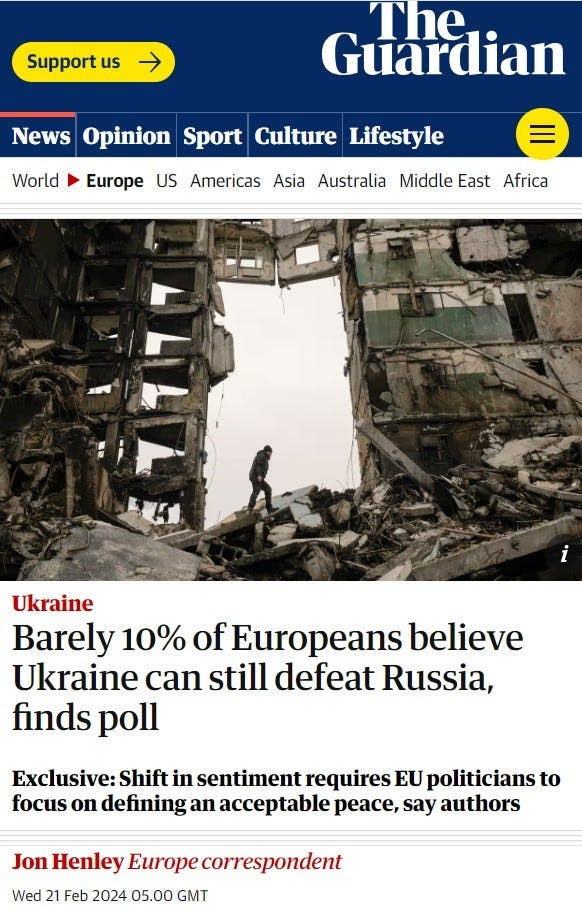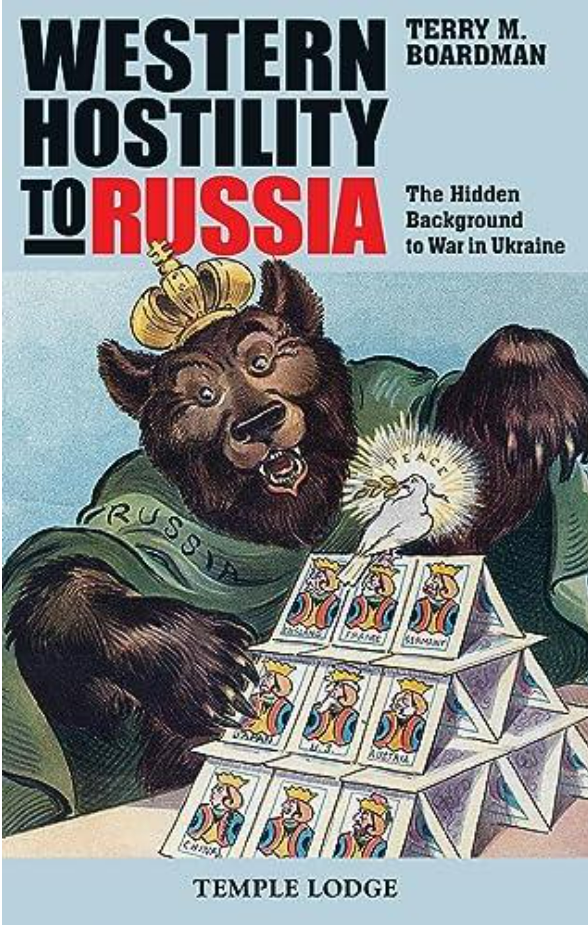Much news in the east
As it had no intention of invading Ukraine, Russia was prepared to negotiate with the United States at the end of 2021. The proof has finally become public. Around the same time this news broke, German NATO generals were discussing their insidious war plans against Russia.
Negotiations on a peace agreement with Ukraine took place even after the West declined to engage in dialogue with Russia and Moscow launched its “Special Military Operation.” The West aborted the peace deal, as I have explained here. Following that, Russia has not ruled out holding talks on war and peace, in contrast to NATO and Ukraine, where Zelensky has issued a presidential decree prohibiting peace talks with Moscow.
Remember what I recently wrote here: Four high-ranking German military officers are looking into how to attack Russia with German weapons – without getting caught.
That is the fact, the scandal.
Not if you consume German media and listen to German politicians.
It was scandalous for them that the Russians dared to wiretap German instigators of war. The Russian wiretapping was not proven, but the outrage was nevertheless great, unlike when the American NSA wiretapped leading German politicians, for example.
It has become clear that the war in Ukraine could have been avoided several weeks before the start of the Russian invasion. This would also have eliminated the threat of a nuclear conflict, which is being evoked by Western politicians through frenzied war rhetoric, either intentionally or unintentionally.
This fact is proven by documents that can be accessed at any time on the website of the Russian Foreign Ministry (as long as this source of information is not also blocked by the “defenders of freedom of opinion” in Brussels and other European capitals).
According to the report, Russia presented two papers to representatives of the United States and NATO at a meeting in Moscow on December 15, 2021: A draft treaty between the USA and Russia on mutual security guarantees and a corresponding agreement between the Russian Federation and the North Atlantic Treaty Organization.
Sure, some of the Russian suggestions would have been difficult for the West to digest – such as the withdrawal of all nuclear weapons from Europe and American troops from the new NATO states, the result of the NATO east expansion Western leaders promised not to carry out decades ago. Similarly, renouncing any further expansion of NATO would have met with resistance. Russia also wanted to ban any military activity on the territory of Ukraine, other Eastern European states, or in the Caucasus.
Moscow’s basic goal was to have frequent lines of communication and agreement between the two sides, whether through the NATO-Russia Council or a red phone. The proposed treaty declares in general that “the parties reaffirm that they do not regard each other as adversaries.” What a difference to today’s war rhetoric from the European capitals.
An initial step toward achieving peace and stability, but the West opposed
The Kremlin was not so naive as to believe that the United States and its allies would ratify the Russian draft agreement on a one-to-one basis. So it was specifically hoped, according to a Moscow press release, that Washington would view the document as a “starting point” for “serious talks… in the near future”. “Critical importance for the preservation of peace and stability” applied to the issue.
The USA and NATO rejected the offer of talks and the draft treaty at the time, apparently without examining them in detail. Instead, the rhetoric before and during the Munich Security Conference in early 2022 became harsher and more bellicose, led by Ukrainian President Volodymyr Zelensky, who called for his country to be equipped with nuclear weapons.
On February 24, 2022, Russian troops invaded Ukraine.
We document the original English version of the Russian Foreign Ministry here, in particular for Europeans and other Westerners whose access to its website may be blocked by the European Union and Western governments.
————————-
17 December 2021 13:26
Agreement on measures to ensure the security of The Russian Federation and member States of the North Atlantic Treaty Organization
The Russian Federation and the member States of the North Atlantic Treaty Organization (NATO), hereinafter referred to as the Parties,
reaffirming their aspiration to improve relations and deepen mutual understanding,
acknowledging that an effective response to contemporary challenges and threats to security in our interdependent world requires joint efforts of all the Parties,
determined to prevent dangerous military activity and therefore reduce the possibility of incidents between their armed forces,
noting that the security interests of each Party require better multilateral cooperation, more political and military stability, predictability, and transparency,
reaffirming their commitment to the purposes and principles of the Charter of the United Nations, the 1975 Helsinki Final Act of the Conference on Security and Co-operation in Europe, the 1997 Founding Act on Mutual Relations, Cooperation and Security between the Russian Federation and the North Atlantic Treaty Organization, the 1994 Code of Conduct on Politico-Military Aspects of Security, the 1999 Charter for European Security, and the Rome Declaration “Russia-NATO Relations: a New Quality” signed by the Heads of State and Government of the Russian Federation and NATO member States in 2002,
have agreed as follows:
Article 1
The Parties shall guide in their relations by the principles of cooperation, equal and indivisible security. They shall not strengthen their security individually, within international organizations, military alliances or coalitions at the expense of the security of other Parties.
The Parties shall settle all international disputes in their mutual relations by peaceful means and refrain from the use or threat of force in any manner inconsistent with the purposes of the United Nations.
The Parties shall not create conditions or situations that pose or could be perceived as a threat to the national security of other Parties.
The Parties shall exercise restraint in military planning and conducting exercises to reduce risks of eventual dangerous situations in accordance with their obligations under international law, including those set out in intergovernmental agreements on the prevention of incidents at sea outside territorial waters and in the airspace above, as well as in intergovernmental agreements on the prevention of dangerous military activities.
Article 2
In order to address issues and settle problems, the Parties shall use the mechanisms of urgent bilateral or multilateral consultations, including the NATO-Russia Council.
The Parties shall regularly and voluntarily exchange assessments of contemporary threats and security challenges, inform each other about military exercises and maneuvers, and main provisions of their military doctrines. All existing mechanisms and tools for confidence-building measures shall be used in order to ensure transparency and predictability of military activities.
Telephone hotlines shall be established to maintain emergency contacts between the Parties.
Article 3
The Parties reaffirm that they do not consider each other as adversaries.
The Parties shall maintain dialogue and interaction on improving mechanisms to prevent incidents on and over the high seas (primarily in the Baltics and the Black Sea region).
Article 4
The Russian Federation and all the Parties that were member States of the North Atlantic Treaty Organization as of 27 May 1997, respectively, shall not deploy military forces and weaponry on the territory of any of the other States in Europe in addition to the forces stationed on that territory as of 27 May 1997. With the consent of all the Parties such deployments can take place in exceptional cases to eliminate a threat to security of one or more Parties.
Article 5
The Parties shall not deploy land-based intermediate- and short-range missiles in areas allowing them to reach the territory of the other Parties.
Article 6
All member States of the North Atlantic Treaty Organization commit themselves to refrain from any further enlargement of NATO, including the accession of Ukraine as well as other States.
Article 7
The Parties that are member States of the North Atlantic Treaty Organization shall not conduct any military activity on the territory of Ukraine as well as other States in the Eastern Europe, in the South Caucasus and in Central Asia.
In order to exclude incidents the Russian Federation and the Parties that are member States of the North Atlantic Treaty Organization shall not conduct military exercises or other military activities above the brigade level in a zone of agreed width and configuration on each side of the border line of the Russian Federation and the states in a military alliance with it, as well as Parties that are member States of the North Atlantic Treaty Organization.
Article 8
This Agreement shall not affect and shall not be interpreted as affecting the primary responsibility of the Security Council of the United Nations for maintaining international peace and security, nor the rights and obligations
of the Parties under the Charter of the United Nations.
Article 9
This Agreement shall enter into force from the date of deposit of the instruments of ratification, expressing consent to be bound by it, with the Depositary by more than a half of the signatory States. With respect to a State that deposited its instrument of ratification at a later date, this Agreement shall enter into force from the date of its deposit.
Each Party to this Agreement may withdraw from it by giving appropriate notice to the Depositary. This Agreement shall terminate for such Party [30] days after receipt of such notice by the Depositary.
This Agreement has been drawn up in Russian, English and French, all texts being equally authentic, and shall be deposited in the archive of the Depositary, which is the Government of …
Done in [the city of …] this [XX] day of [XX] two thousand and [XX].
————————-
Absurdly, Putin’s peace proposals are rejected by Western warmongers, who then accuse him of being a warmonger.
This is a further piece of evidence of the West’s bellicosity in addition to the others: The many CIA bases in Ukraine conducting hostile, anti-Russian operations since 2014, the rejection of Russia’s proposal for a European security architecture, and the shooting down of a peace agreement between Moscow and Kiev that was ready to be signed.
Vladimir Putin has repeatedly indicated his willingness to negotiate. In interviews and speeches. But the West is intensifying the confrontation. It justifies it with foolish lies: Russian troops, which take months to take a small Ukrainian town, are miraculously in Warsaw a day later and in Berlin immediately afterwards.

The goal of Western politicians and their media allies is to deceive the public. However, the latter are not foolish. All politicians and media outlets need to do is look at the polls.

